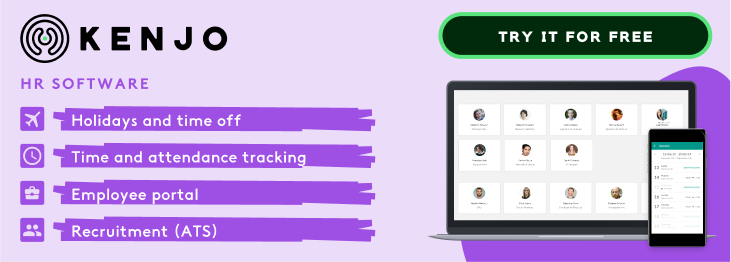The HR consultant has become an important asset to all types of businesses. With their expertise and understanding of how the human resources department works they can advise on many different business areas and help organisations operate at their fullest potential.
In this article, we will explain in detail what an HR consultant’s role involves and what you need to do to become one.
What are an HR consultant’s job duties?
Human resources consultants are external professionals that companies sometimes contract to meet a specific HR need or support the HR department. An HR consultant’s job duties, therefore, will depend on their specialist sector, and each company’s individual requirements.
Generally, there are two reasons why companies hire a consultant:
- It is a small business without a dedicated HR team or the necessary experience and resources to undertake important projects or regular tasks like payroll for example. The company may require the services of an external professional in this situation.
- It is a large company, with an HR team, but it wants to get an external professional’s perspective when faced with a particular challenge or project. This consultant will offer their point of view without being “tainted” by internal politics or personal relationships, etc.
Some of the most important duties an HR consultant will carry out include:
Baseline analysis and evaluation
HR consultants are sometimes asked to carry out a detailed audit or analysis of the department’s current procedures and policies, etc. This will involve gathering information and delivering it in the form of a report with proposed improvements and recommendations on how to perfect the organisation’s HR systems.

Legal compliance
Complying with employment law can be complex, especially if there is no in-house specialist (which is often the case, particularly in SMEs). HR consultants can ensure company programmes and systems are in line with established rules and regulations and current UK legislation.
Training
Another of the HR consultant’s job duties is to design and present training programmes on new procedures or areas of human resources, such as health and safety, or HR software.
Recruitment
Sometimes companies need to recruit for a very specific role or may have urgent hiring needs due to rapid growth. In these cases, outsourcing recruitment to a specialist consultant can often achieve better and faster results.
Software and IT systems
An HR consultant may suggest implementing specific HR software or IT systems as part of their recommendations for improvement. They will often work alongside the company during the implementation process and help train the staff on new processes.
Monitoring
The consultant’s role does not stop once they submit their proposal and leave the building. On the contrary, it is essential to follow up and evaluate any changes that have been introduced in the organisation. In this way, they will be able to make any necessary alterations to ensure objectives are met.
What qualifications and skills do you need as an HR consultant?
While there is no one route to becoming an HR consultant, the most successful professionals will have a combination of relevant qualifications, experience and hard and soft skills. Before you dive into this profession, it is important to critically analyse your own CV and decide if you are genuinely qualified.
HR consultant qualifications
You do not need a specific degree to become a human resources consultant. However, most start with a BSc/BA in Human Resources, Business Administration or a similar field. Many aspiring HR consultants also go on to study for postgraduate qualifications, such as a Masters in Human Resources, or a course centred on department management and leadership
There are also opportunities to gain qualifications with the Chartered Institute of Personnel and Development (CIPD), such as the Diploma in Human Resource Management.
However, proven experience is key. Consultants usually have a long career behind them, conferring the authority and expertise required to advise companies on how to manage their HR department. Remember that organisations hire consultants to fill the gaps they have internally.
What skills and personality traits should an HR consultant have?
Alongside the theoretical knowledge gained through their qualifications, successful HR consultants will also possess certain skills and characteristics. These should include:
- Project management experience
- In depth knowledge of HR principles, functions, methods, and best practices
- Strong knowledge of investigation and analysis methodology
- An analytical mindset
- Experience with IT programs, especially HR software
- Ability to design strategies and formulate business plans
- Problem solving capabilities
- Excellent communication and consulting skills
- Teamworking skills.
Any relevant qualifications above and beyond this will always prove valuable.
What is the average salary of an HR consultant?
An HR consultant’s income will depend on several variables, such as their level of experience, qualifications, location, sector and seniority.
In Spain, for example, GlassDoor puts the average figure at €46.876 per year. In the UK, according to Change Board, the average salary is £41,186. However, a junior consultant can expect to start at £29,000, while senior workers with substantial experience can earn up to £58,000 annually. Some HR professionals choose to study for a postgraduate degree to attract a higher income earlier on in their career.

How can Kenjo and HR consultants work together?
Overall, the HR consultant’s role is to guide companies and organisations on best practices in employee management and implement improvements where possible. As we mentioned above, this may mean recommending custom HR software to streamline processes and introduce efficiencies. With cloud-based HR software like Kenjo, for example, companies can consolidate many HR requirements into one system, leading to time and cost savings, and happier employees.
Kenjo runs a partner program, working with HR consultants to implement our all-in-one software for their clients. The aim is to help HR consultants improve their reputation in the sector and earn extra income by bringing value to SMEs. HR professionals can either simply refer leads to Kenjo, or take care of the entire sales and implementation process for their clients.
To find out more about becoming a Kenjo partner, click here.



